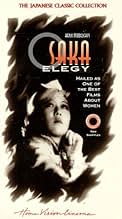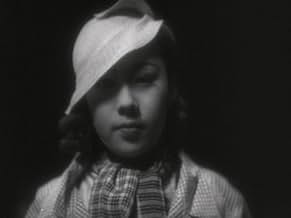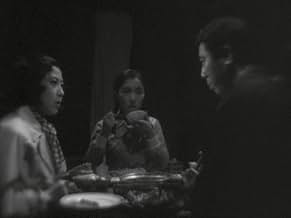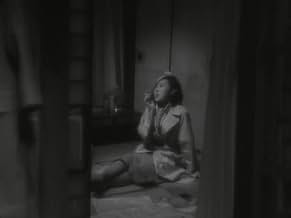AVALIAÇÃO DA IMDb
7,2/10
2,7 mil
SUA AVALIAÇÃO
Adicionar um enredo no seu idiomaA young woman becomes a mistress of her boss in order to support her family.A young woman becomes a mistress of her boss in order to support her family.A young woman becomes a mistress of her boss in order to support her family.
- Direção
- Roteiristas
- Artistas
Avaliações em destaque
This film begins with a relatively wealthy--but extremely grouchy--old man by the name of "Sonosuke Asai" (Benkei Shiganoya) harping on all those around him for very minor issues. It's during this time that his wife "Sumiko" (Yôko Umemura) sarcastically recommends that he gets himself a young mistress since he no longer finds her appealing. That being said, it just so happens that there is a young employee at his office named "Ayako Murai" (Isuzu Yamada) that he finds quite attractive and knowing that she is in desperate need of money due to a family matter offers her the unenviable position. In any case, faced with very little choice she reluctantly accepts his offer. Unfortunately, even though she tries to do what is best for her family, she soon discovers that she has lost the respect of everyone of any consequence to her. Now rather than reveal any more I will just say that I initially thought that this was a comedy as the first few scenes seemed rather light-hearted. But things change rather remarkably later on. On another note, it should be mentioned that silent films lasted a bit longer in Japan than most other industrialized nations and that this was one of the first pictures to utilize sound. Be that as it may, I thought that this was a pretty good movie and I have rated it accordingly. Above average.
...with a plot out of Precode Hollywood and frequent jazz music to match. A pretty young switchboard operator reluctantly decides to become the mistress of her boss so she can help her financially-strapped father who had embezzled company funds for an investment that went bad, and her college-student brother who needs his tuition paid. Of course she is ostracized from the family for her immorality without giving her the chance to explain how they got their money. Various other relationships and subplots also come into play. This one has nicely-plotted character dynamics, good performances, and beautiful cinematography.
Ayako (Isuzu Yamada) becomes the mistress of her boss, Mr. Asai, so she can pay her father's debt, and prevent him from going to prison for embezzlement. She also sends money to her brother Hiroshi to pay his university tuition, but her father intercepts it.
Mizoguchi considered the film his first serious effort as a director, and while I am not familiar with his earlier work, I have to say this is the kind of film that leaves a mark. Either Mizoguchi or his cinematographer had an excellent awareness of the camera -- the door closing to block the camera early on in the film -- years ahead of its time.
The subject matter in general is impressive. I am not sure what the typical morality was in pre-war Japan, but to feature adultery and whatnot in the 1930s seems quite bold.
Mizoguchi considered the film his first serious effort as a director, and while I am not familiar with his earlier work, I have to say this is the kind of film that leaves a mark. Either Mizoguchi or his cinematographer had an excellent awareness of the camera -- the door closing to block the camera early on in the film -- years ahead of its time.
The subject matter in general is impressive. I am not sure what the typical morality was in pre-war Japan, but to feature adultery and whatnot in the 1930s seems quite bold.
This is the first collaboration between Mizoguchi and writer Yoshikata Yoda, with the actress Isuzu Yamada in the principal role, as a young telephonist pushed to prostitution to save her ruined family, and then repudiated by them. Mizoguchi begins his impressive mastership with the framing and the perspective and, though still far from his masterpieces, is an interesting milestone for the Mizoguchi admirers.
I believe the challenge here was to conceive of a film in terms of bunraku - the traditional Japanese puppet theater - and extrapolate from the environment a structure, so one stage where heightened drama unfolds, controlled, with a view of the mechanisms handling the illusion, and then a second stage on the side to supply a rotation of music and voice expressing emotion. This is very well thought out, something to keep in mind when viewing later Mizoguchi where melodrama lacks annotation.
This translates in our film as melodrama about a bold young woman who gambles away on her dignity and reputation because the world around her is desperate for either money or sex, the controlling mechanism is that only the viewer is in possession of all the facts and so is able to read tragic fate in every exchange. This has been noted by some viewers as film noir, because the woman appears to function as a femme fatale, but the Japanese have no affinity for this sort of trope.
So of course, in accordance with bunraku, the woman is a puppeteer but also herself a puppet, a figure on the same stage as the play she enacts, her movements subject to our scrutiny. You will note this in tandem with, and reversing, an earlier Mizoguchi - The Water Magician - about a water artist whose life is merged with the transitory flows she used to control.
This is beautifully rendered in a scene where she is caught with her boss on a night out to watch a bunraku play. She has set a plot in motion, attempting control, an active role, but unpredictable life foils her. The wife demands explanations but seems the most irate for noticing the hairstyle on the girl, signifying a married woman, her role on the stage being supplanted even though it's a loveless marriage and thankless role. Moments before, however, we have seen an excerpt from the play, where inside the artifice, the controlled fiction, it was the suspicious husband accusing the woman of adultery.
This would have an ordinary ironic effect if mapped cleanly to the situation outside the stage, but it doesn't, it's wholly asymmetrical, the tension all in the imbalance of familiar elements framed askew. You have to puzzle about assigning to the players the puppet-master's controls. This is the touch lacking in Ozu's Floating Weeds.
The music is not in the emotional after-effects of storytelling, this too part of the heightened artifice. The music is in the camera, caressing day from night.
This translates in our film as melodrama about a bold young woman who gambles away on her dignity and reputation because the world around her is desperate for either money or sex, the controlling mechanism is that only the viewer is in possession of all the facts and so is able to read tragic fate in every exchange. This has been noted by some viewers as film noir, because the woman appears to function as a femme fatale, but the Japanese have no affinity for this sort of trope.
So of course, in accordance with bunraku, the woman is a puppeteer but also herself a puppet, a figure on the same stage as the play she enacts, her movements subject to our scrutiny. You will note this in tandem with, and reversing, an earlier Mizoguchi - The Water Magician - about a water artist whose life is merged with the transitory flows she used to control.
This is beautifully rendered in a scene where she is caught with her boss on a night out to watch a bunraku play. She has set a plot in motion, attempting control, an active role, but unpredictable life foils her. The wife demands explanations but seems the most irate for noticing the hairstyle on the girl, signifying a married woman, her role on the stage being supplanted even though it's a loveless marriage and thankless role. Moments before, however, we have seen an excerpt from the play, where inside the artifice, the controlled fiction, it was the suspicious husband accusing the woman of adultery.
This would have an ordinary ironic effect if mapped cleanly to the situation outside the stage, but it doesn't, it's wholly asymmetrical, the tension all in the imbalance of familiar elements framed askew. You have to puzzle about assigning to the players the puppet-master's controls. This is the touch lacking in Ozu's Floating Weeds.
The music is not in the emotional after-effects of storytelling, this too part of the heightened artifice. The music is in the camera, caressing day from night.
Você sabia?
- Citações
Junzo Murai: You're a woman... Being taken to the police station... Getting thrown into jail... You've done shameful things. You ungrateful child!
Ayako Murai: How could you say that? I never expected that I'd be treated like this when I came home. This is ridiculous! I thought you would welcome me with open arms. If I'd have known this, I never would have come back.
- ConexõesFeatured in Century of Cinema: Nihon eiga no hyaku nen (1995)
Principais escolhas
Faça login para avaliar e ver a lista de recomendações personalizadas
- How long is Osaka Elegy?Fornecido pela Alexa
Detalhes
- Tempo de duração
- 1 h 11 min(71 min)
- Cor
- Mixagem de som
- Proporção
- 1.37 : 1
Contribua para esta página
Sugerir uma alteração ou adicionar conteúdo ausente

























